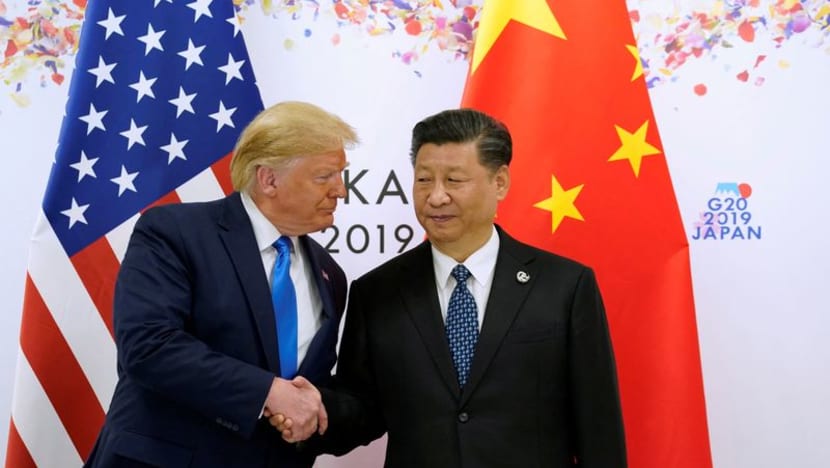Commentary: A Xi appearance at Trump’s inauguration would give China the upper hand
While much has been written on why Chinese President Xi Jinping is unlikely to accept Donald Trump’s invitation to attend his Jan 20 inauguration, there are compelling reasons for him to do so, says former SCMP editor-in-chief Wang Xiangwei.


This audio is generated by an AI tool.
HONG KONG: Ever since news broke in mid-December that US president-elect Donald Trump had invited Chinese President Xi Jinping to Washington for his inauguration on Jan 20, it has become a popular topic of discussion among Chinese observers of the increasingly intense rivalry between the world’s two largest economies.
Judging by social media chatter in China, a consensus seems to have emerged that Xi is unlikely to fly to Washington. The highly unusual nature of the invitation, the unpredictability of his host, and the perceived political and reputational risks for China’s top leader are all contributing factors.
While much has been written on why Xi is unlikely to go, I would like to argue that there are far more compelling reasons for him to accept Trump’s invitation. Doing so could give Xi a strategic advantage, regardless of how the visit unfolds.
A FEAST THAT CHANGED HISTORY
Xi, reportedly an ardent student of history, can certainly draw inspiration and courage from statesmen such as Mao Zedong and Richard Nixon, who are remembered for undertaking highly unusual and high-stakes trips.
From the perspective of some Chinese analysts, Trump’s unusual invite reminds them of a legendary event that took place in 206 BC, widely known as the Hongmen Banquet. This event is immortalised in Chinese history, fiction and popular culture. It involved a power struggle between two rival generals, Xiang Yu and Liu Bang, who separately led rebel forces against the Qin Dynasty.
Xiang, who led a much stronger army, invited Liu to a banquet with the intention of killing him. Despite being informed in advance of Xiang’s intention, Liu went anyway and managed to escape unscathed. The banquet marked the beginning of a brutal war that ended with Liu defeating Xiang and establishing the Han Dynasty.
As the legend goes, Liu displayed exceptional ingenuity to placate Xiang and defuse several crises during the feast in order to buy time for his eventual victory. The Hongmen Banquet has since become a popular metaphor for an invitation with impure intentions to harm or humiliate the invitee.
It is within this context that some Chinese analysts believe Xi should not attend Trump’s inauguration, as such a visit would see him paying respects to Trump and strengthening his authority, potentially putting China’s top leader in a weaker position.
Moreover, given that Trump has begun to pack his incoming administration with China hawks and made it clear he would increase tariffs on Chinese imports on the first day of his second term, there are concerns that if Xi makes the trip and returns empty-handed, it could weaken his credibility and standing.
While these political risks are real and understandable, Xi can certainly learn from Mao Zedong, the founding father of the People’s Republic of China, and turn the disadvantages into genuine advantages.
WHAT IF CHINA AND THE US ACTUALLY GOT ALONG?
Following the end of the war of resistance against Japanese aggression in 1945, Chiang Kai-shek, head of the KMT-led nationalist government, invited Mao, head of the Communist forces, to the wartime capital of Chongqing to discuss China’s future and the relationship between the two rival parties.
Under the auspices of the US and encouraged by the then Soviet Union, Mao flew to Chongqing for 43 days of talks, known as the Chongqing Negotiations, which led to a peace pact known as the Double Tenth Agreement. Although the two long-time enemies did not honour the agreement and the civil war resumed, ending in Communist victory and the founding of the People’s Republic in 1949, Mao conveyed an image of a reasonable man seeking peace in the eyes of the international community.
Now, the US-China relationship is at a critical crossroads, with both countries confronting each other on issues ranging from trade and technology to space, Taiwan, Hong Kong and human rights. Amid mounting concerns that the bilateral relationship will deteriorate further, Xi’s acceptance of Trump’s inauguration invitation presents an opportunity that should not be missed. As China’s top leader has repeatedly said, both countries stand to gain from cooperation and lose from confrontation.
Interestingly, Trump told reporters on Dec 17 that Beijing and Washington could work together to “solve all of the problems of the world”. Given Trump’s impulsive and unpredictable nature, it is hard to know if he means what he says.
However, his sweeping statement crystallises the most critical issue to ensure world peace: Both Beijing and Washington should revisit a G2 approach to their relationship, in which they can develop a competitive and cooperative relationship to address bilateral problems and tackle global challenges.
Following his recent trip to China, Thomas Friedman, a columnist with the New York Times, wrote that Beijing and Washington should team up to tackle a much bigger common enemy - disorder. I could not agree more.
Friedman suggested that Trump should explore a “Nixon goes to China” move to seek the much-needed rapprochement between the two countries for the sake of a stable 21st century.
Drawing from history and given the high stakes, China’s leadership should seriously consider a move of “Xi goes to Washington”, to gain the upper hand.
Wang Xiangwei is a former Editor-In-Chief of South China Morning Post. He now teaches journalism at Hong Kong Baptist University.



















